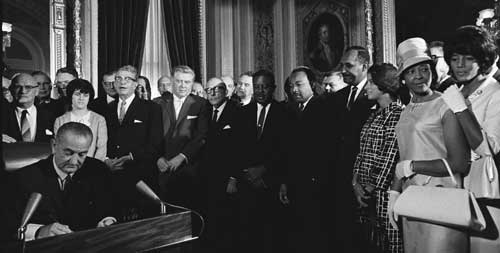|
August 6, 2005 While the department
is engaged in a series
of events to mark the centennial of the founding of the Niagara Movement,
we note that this year also marks, poignantly, the 40th anniversary of
the passage of the Voting Rights Act of 1965, and the 50th anniversary
of the commencement of the Mongomery Bus Boycott that helped launch the
modern civil rights movement in our country. As in the case of all major
social movements, it is doubtful that the architects of the Niagara Movement
could have foreseen the profound changes they would set in motion in a
mere 60 or so years in the entire fabric of our nation.
Meeting against the backdrop, at the turn of the century, of a Jim Crow-dominated society with its gruesome practice of ritually murdering African Americans in the context of public celebratory spectacles that came to be known as lynching, the legacy of the work of the intrepid few meeting across the border in Niagara Falls (for reasons not too difficult to surmise, given the times), includes Brown v. Board of Education (1954), the Civil Rights Act of 1964 and the Voting Rights Act of 1965. While
these achievements were born of a struggle that had its roots going back
nearly three hundred years to the shores of Africa, we note with profound
satisfaction that the compass of its beneficiaries has been, as is fitting
in a democracy, wider than the African diaspora to include all--Native
Americans, women, Hispanic Americans, Asian Americans, the workingclass
EuroAmerican masses, and so on--who had
originally been left out of the great democratic project launched by the founders of the American Revolution meeting at the Constitutional Convention in 1787. However, even as we celebrate these major milestones in the construction of our democracy we are reminded of the burden of eternal vigilance against the dark forces of reaction that are always bent on turning back the clock of progress. After all, the promise of a new democratic tomorrow had already been clearly laid out in the magisterial 13th, 14th, and 15th Amendments to the Constitution. Yet it did not take long to gut the intent of these amendments through such bogus concepts as “separate but equal” by means of a variety of instruments including, most sadly, the rulings of the Supreme Court in such cases as the Civil Rights Cases (1883) and Plessy v. Ferguson (1896). Even today, the struggle to implement the Voting Rights Act to its fullest intent has not ended. The permanent disenfranchisement of felons even after they have served their time, being just one example; the undermining of the franchise of members of poor communities who cannot afford modern voting technologies being another. Moreover, we note with great concern that a disproportionately large number of those so affected come from minority groups. The struggle to build a better democracy therefore continues; it has not ended. ygml/2005 For information on persons, facts, and events mentioned in this statement see the select materials indicated in the left column. |


